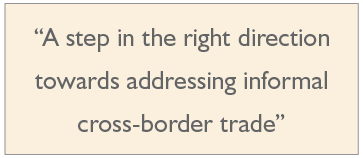
By Sternford Moyo, Scanlen & Holderness
Recently, Zimbabwe, a member of the WTO since 1995, ratified the WTO Trade Facilitation Agreement (TFA) becoming the 139th WTO Member State to ratify this Agreement. This development comes at a time when President Emmerson Mnangagwa’s government is making progressive efforts to open the country for business, to attract investors and to re-engage with the international business community. This article assesses the potential impact that the implementation of the TFA will have towards reducing informal cross border trade (ICBT) at Zimbabwe’s borders.
The TFA was concluded in 2013 and entered into force on February 22, 2017, after being ratified by a two thirds majority of the WTO membership (110 of 164). The obligations contained in the TFA are only binding to those WTO members that have ratified the Agreement. In terms of section 327 of the Constitution of Zimbabwe of 2013, an international treaty which has been concluded by the President or under his authority becomes legally binding once it has been approved by Parliament and has been enacted into law through an Act of Parliament. This means that once Parliament has ratified and enacted the TFA into an Act only then will Zimbabwe be legally bound to implement and enforce the self-selected obligations contained in this agreement that it has committed to implementing. At the time of writing this article Parliament had not approved and/or enacted the agreement into domestic law.
Generally, the TFA aims at simplifying trade procedures to facilitate the easy movement of goods across borders. It contains provisions aimed at expediting the movement, release and clearance of goods, including goods in transit. Moreover, the agreement covers measures relating to effective cooperation between customs and other appropriate authorities on trade facilitation and customs compliance issues, technical assistance and capacity building for WTO Member States.

For Zimbabwe, the ratification of the TFA is a step in the right direction towards reducing ICBT and promoting formal cross border trade. The African Development Bank (AfDB) has defined ICBT as “trade in processed or non-processed merchandise which may be legal imports or exports on one side of the border and illicit on the other side and vice-versa, on account of not having been subjected to statutory border formalities such as customs clearance”. Research done to date by various international organisations show that ICBT at Zimbabwe’s main border posts is primarily caused by among others high trade costs, complex customs and burdensome administrative procedures and a lack of trade-related information.
Also, in the practice of ICBT, numerous vices have sprouted and have been reported at different Zimbabwean border posts such as the sexual abuse of traders, corruption by government officials, massive loss of revenue through non-payment of customs tax, drugs and arms smuggling, human trafficking, unfair competition on formal businesses and smuggling of consumables which evade sanitary and phytosanitary checks thus posing serious health risks to consumers.
ICBT constitutes a significant part of the informal economy in Zimbabwe and Southern African Development Community (SADC) at large. The Food and Agriculture Organisation in a report published in 2017 estimated the size of ICBT in SADC, which Zimbabwe is a member of, to be valued at US$17.6 billion per year. This goes a long way towards emphasising the size of ICBT and reducing it will facilitate a stronger formal cross border trade practice that will be underpinned by favourable trading conditions and legal protections as well as numerous economic dividends for the nation’s economy.
It is hoped that all these commitments will go a long way towards reducing ICBT and contributing towards national economic growth. Through the TFA, Zimbabwe will significantly benefit from its full implementation as it is likely to increase trade with its trading partners regionally and globally. The country will likely see a reduction in trade costs which will increase trade opportunities for SMEs, individuals, women and youth who are most engaging in ICBT to participate in cross border trade.
Furthermore, Zimbabwe’s export earnings will likely grow significantly. The TFA will also boost the entry and marketability of SME’s into the international market, attract investment and improve the ease of doing business as well as the socio-economic well-being of its citizens.
____________________________
LEX Africa is an alliance of law firms with over 600 lawyers in 24 African countries formed in 1993. More information may be found at www.lexafrica.com.

W: www.scanlenandholderness.com
T: (263) 4 702 561


